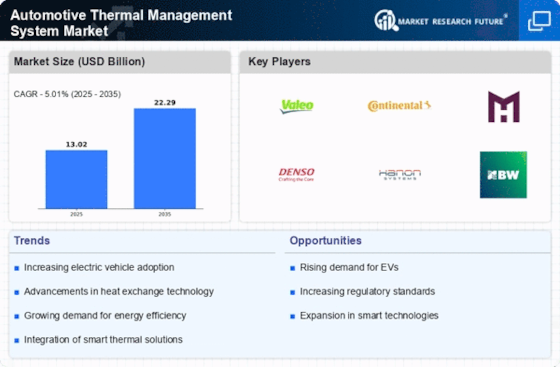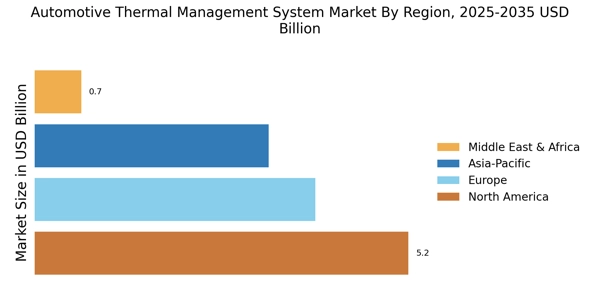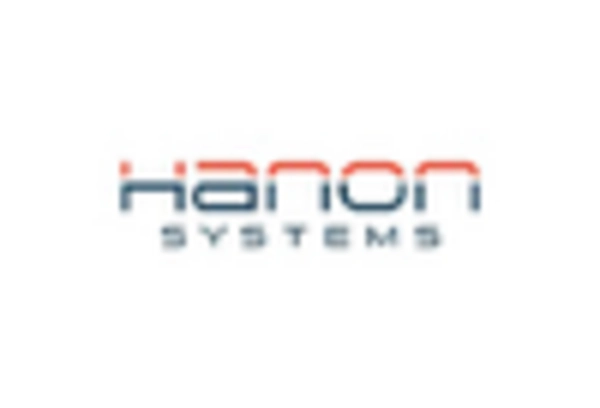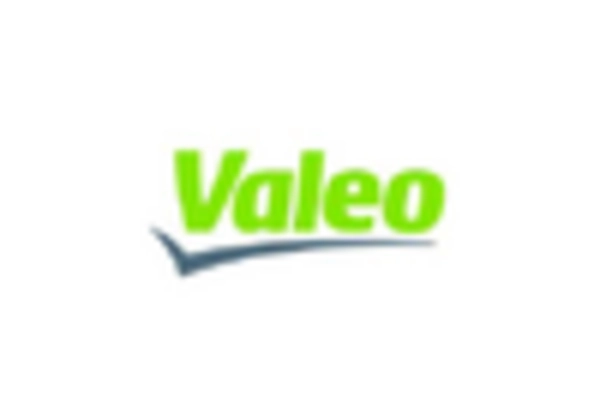Growth of Electric Vehicles
The Automotive Thermal Management System Market is significantly influenced by the rapid growth of electric vehicles (EVs). As the adoption of EVs accelerates, the need for efficient thermal management systems becomes paramount to ensure optimal battery performance and longevity. Effective thermal management is crucial for maintaining battery temperature within safe limits, thereby enhancing vehicle range and safety. Reports indicate that the EV market is projected to grow at a compound annual growth rate of over 20% in the coming years. This growth presents a substantial opportunity for thermal management system providers to develop specialized solutions tailored for electric vehicles.
Increasing Demand for Fuel Efficiency
The Automotive Thermal Management System Market is experiencing a notable surge in demand for fuel-efficient vehicles. As consumers become more environmentally conscious, automakers are compelled to enhance the thermal management systems in their vehicles to optimize fuel consumption. This trend is further supported by regulatory frameworks that mandate lower emissions and improved fuel economy. According to recent data, vehicles equipped with advanced thermal management systems can achieve up to 15% better fuel efficiency compared to traditional systems. Consequently, manufacturers are investing in innovative thermal management solutions to meet these evolving consumer preferences and regulatory requirements.
Regulatory Pressure for Emission Reductions
The Automotive Thermal Management System Market is significantly impacted by regulatory pressures aimed at reducing vehicle emissions. Governments worldwide are implementing stringent emission standards that compel manufacturers to adopt advanced thermal management solutions to comply with these regulations. Effective thermal management systems play a crucial role in minimizing emissions by optimizing engine performance and reducing fuel consumption. As a result, the market for thermal management systems is expected to grow as automakers seek to meet these regulatory requirements. Data indicates that compliance with emission standards can lead to a 10% reduction in greenhouse gas emissions, further driving the demand for innovative thermal management technologies.
Rising Consumer Awareness of Vehicle Performance
The Automotive Thermal Management System Market is benefiting from a rise in consumer awareness regarding vehicle performance and reliability. As consumers increasingly prioritize performance attributes, such as engine efficiency and thermal stability, the demand for sophisticated thermal management systems is expected to grow. This heightened awareness is prompting automakers to invest in advanced thermal management solutions that can enhance overall vehicle performance. Market analysis suggests that vehicles with superior thermal management capabilities are perceived as more reliable, which can influence purchasing decisions. Consequently, this trend is likely to drive the expansion of the thermal management system market.
Technological Advancements in Thermal Management
The Automotive Thermal Management System Market is witnessing a wave of technological advancements that are reshaping the landscape of thermal management solutions. Innovations such as phase change materials, advanced heat exchangers, and smart sensors are being integrated into thermal management systems to improve efficiency and performance. These technologies not only enhance the thermal regulation of vehicles but also contribute to weight reduction and space optimization. As manufacturers strive to differentiate their offerings, the incorporation of cutting-edge technologies is likely to drive the demand for advanced thermal management systems, thereby propelling market growth.

















